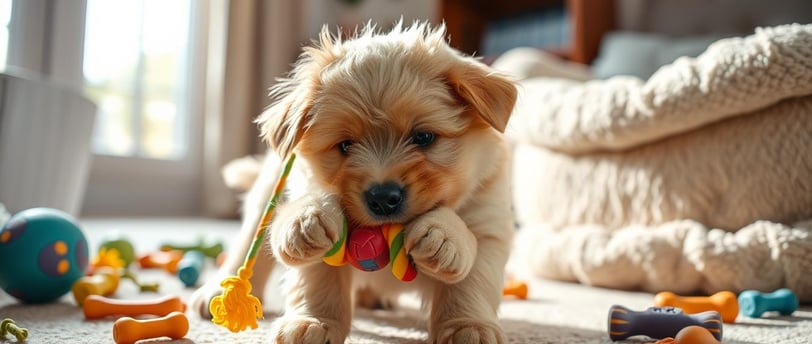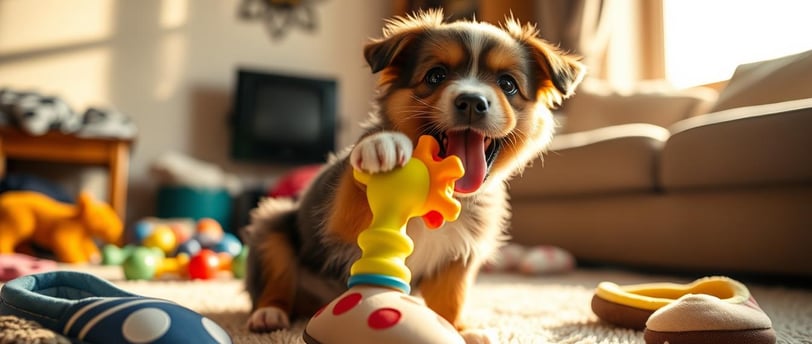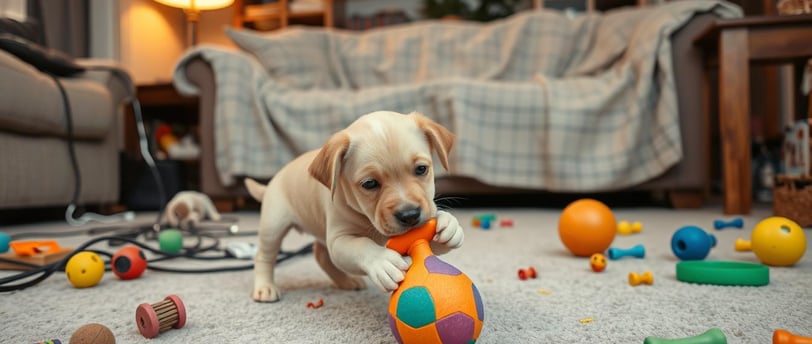Surviving Puppy Chewing: puppy teething timeline
Discover essential tips for dog owners to manage and survive puppy chewing, ensuring a safe environment and promoting healthy habits for your furry friend. puppy teething timeline
The Canine Chronicles
9/2/20248 min read


Did you know the average American household spends over $1,200 a year on pets?
This includes chewing damage, which is a big part of it.
As a new dog owner, you might feel frustrated seeing your puppy chew on your favorite shoes or the coffee table leg.
Puppy chewing is normal, but it can be tough for even the most patient owners.
But don't worry, you can get through the puppy chewing phase with the right strategies and patience. In this article, we'll look at why puppies chew, how long it lasts, and some tips to help you manage it. These tips are key to your puppy's growth and keeping your home safe.
Key Takeaways
Puppy chewing is a normal behavior as puppies are teething and strengthening their jaws.
The puppy chewing phase can last up to 2 years, but with the right strategies, you can survive this period.
Providing appropriate chew toys, puppy-proofing your home, and teaching bite inhibition are essential for managing puppy chewing.
Ensuring adequate exercise and mental stimulation for your puppy can also help minimize destructive chewing.
Caring for your adult dog's teeth is important for their overall health and well-being.
Understanding the Puppy Chewing Phase
As your new furry friend grows from a puppy to an adult, chewing is a common behavior you'll see. It's a normal part of their development. Puppies chew for many reasons, all tied to their natural instincts and growth stages.
Why Puppies Chew
Puppies chew mainly to ease the pain in their gums during teething. This happens around 2-4 months old as baby teeth come in and are replaced by adult teeth. Chewing helps ease their pain and makes their jaws stronger.
Chewing is also key to a puppy's social growth. They learn how to play and interact with others by biting and mouthing during play. This skill is vital for their future.
Furthermore, puppies chew to explore and understand their world. It's how they check out their surroundings and satisfy their curiosity. If they're bored, chewing helps them use their minds and release energy.
"Chewing is a normal behavior for puppies, and it's important to understand the reasons behind it in order to manage this phase effectively."
Knowing why your puppy chews helps you handle this stage with patience and understanding.
How Long Does the Puppy Chewing Phase Last?
The puppy chewing phase can be tough for new dog owners. It's not just a short phase; it can last up to 1-2 years. This depends on the breed and your puppy's unique personality.
Chewing starts early, around 2-3 weeks old, as puppies get their baby teeth. It ends when adult teeth come in, usually by 4-6 months. But, puppies might keep chewing as they grow and explore, from 7-12 months old.
"Puppies can chew for a lot longer than most people expect. Owners need to be prepared to manage this prolonged chewing phase with patience and the right training techniques."
Managing the puppy teething timeline means giving them lots of chew toys and training. This helps them learn not to chew on things they shouldn't. With patience and the right methods, your puppy will grow into a well-behaved adult dog.
The puppy chewing phase can last up to 1-2 years, depending on breed and individual personality.
Chewing is most intense during the teething process, from 2-3 weeks to 4-6 months old.
Puppies may continue chewing through their adolescent stage, from 7-12 months old.
Knowing how long the puppy chewing lasts helps you support your pup. With the right approach, you can make this stage easier for both of you.
Dogs Trust: https://www.dogstrust.org.uk/dog-advice/training/unwanted-behaviours/stop-your-dog-chewing-mouthing

How to Survive the Puppy Chewing Phase
Dealing with puppy chewing can be tough, but the right chew toys can help. Puppy teething is a normal part of growing up. Giving your puppy safe chew toys is key to keeping your home safe.
Provide Appropriate Chew Toys
For puppy teething toys, having a variety is important. Offer your pup different textures and shapes, like:
Rubber toys that can be frozen to soothe sore gums
Edible chews like bully sticks or pig ears
Flavored puppy teething rings
Choose chew toys that are safe and fit your puppy's size and stage. Hard chews can hurt their teeth. Always watch your puppy during playtime.
Change the toys often to keep your puppy interested. Giving treats when they chew on the right toys helps them learn good habits. This makes the chewing phase easier to handle.
"Providing the right chew toys is essential for keeping your puppy happy and your home intact during the teething phase."
By knowing what your puppy needs and giving them the right chew toys, you can get through the chewing phase easily. This helps your puppy develop good habits that will last forever.
Puppy-Proofing Your Home
Getting your home ready for a new puppy is key to making it through the chewing phase. It means protecting your stuff and stopping your puppy from chewing on things they shouldn't. By making your home safe, you keep your puppy out of trouble and your things safe.
Begin by taking away small, tempting things like shoes, books, and toys. Keep furniture, cords, and other dangers away from your puppy. You might also use bitter-tasting sprays on things you don't want your puppy to chew.
When you can't watch your puppy, put them in a safe spot like a crate or a puppy-proofed room. This stops them from chewing on things they shouldn't and helps them learn what's okay and what's not.
"Thorough puppy-proofing is essential for surviving the chewing phase. It's all about setting your pup up for success."
Protecting your home from your puppy's chewing is a must. By taking steps to keep your things safe and your puppy from chewing, you make a safe place for your new friend.
American Kennel Club (AKC): https://www.akc.org/expert-advice/training/what-puppy-can-safely-chew/


How to Stop Puppy Nipping
Puppy nipping can be frustrating for new dog owners. But, with the right training, you can teach your pup to stop. The key is puppy bite inhibition. This teaches your furry friend the right amount of force when chewing or mouthing.
Teaching Bite Inhibition
To stop puppy nipping, act like another puppy would when bitten. When your pup bites you, make a high-pitched "ouch" sound. Then, turn away or end the play. This shows your puppy that biting means losing your attention, which they don't like.
You can also give your puppy an approved puppy training toy when they bite. This teaches them what's okay to chew on and what's not.
With patience and consistency, your puppy will learn to chew gently. This is important for their development. Stick with it, and you'll have a well-behaved pup soon.
"Consistency is key when teaching your puppy not to nip. With time and positive reinforcement, they'll learn what's acceptable and what's not."
How to Survive the Puppy Chewing Phase
Dealing with puppy chewing can be tough but key to raising a dog. To survive this phase, use management, redirection, and patience together.
Start by puppy-proofing your home. Remove or secure items your pup might chew on. Give them safe chew toys to keep them busy. When you see them chewing wrong things, redirect their attention to toys and praise them.
Make sure your puppy gets enough exercise and mental stimulation. A bored puppy may chew more. So, have regular playtime, training, and fun activities.
When you're not watching, put your puppy in a safe area. This could be a crate or a room without things to chew on. With patience and consistency, your puppy will grow out of this. Remember, this chewing is normal.
"Surviving the puppy chewing phase requires patience, consistency, and a little creativity. Hang in there – it won't last forever!"
Learning how to survive puppy chewing, managing puppy chewing, and coping with puppy chewing is key. With the right methods and a positive outlook, you'll make it through. And you'll enjoy having a happy, healthy dog.


Caring for Adult Dog Teeth
As your puppy grows into an adult dog, their chewing habits may change. But, keeping their teeth healthy is still key. Adult dogs still have a natural instinct to chew. So, giving them chew toys and treats can help. It also keeps their mouths clean.
Brushing your adult dog's teeth regularly is a must. Start getting your pup used to tooth brushing early with dog-safe toothpaste. This habit keeps their teeth clean and healthy as they get older.
Don't forget about routine veterinary dental cleanings for your adult dog. These check-ups remove tartar and plaque. This helps prevent gum disease, tooth loss, and other dental issues.
By adding these dog dental care steps to your routine, you keep your adult dog's adult dog teeth strong and healthy. This prevents dental issues later on.
"Maintaining good oral hygiene is just as important for dogs as it is for humans. Regular dental care can make a big difference in your pet's overall health and well-being."
With the right dog dental care methods, your furry friend can have happy, healthy teeth for a long time.
Conclusion
Raising a new puppy means dealing with chewing. It's a normal part of their growth. By understanding why they chew and using the right strategies, you can make it easier. This helps your pup grow into a well-behaved adult dog.
Start by giving them safe chew toys and making your home puppy-proof. Teach them not to bite too hard and slowly introduce dental care. Being proactive, consistent, and patient is key. This way, you and your puppy can get through the chewing phase together.
Remember, tips on how to handle puppy chewing, surviving the puppy phase, and good training advice are crucial. By using these tips, you'll enjoy a rewarding time with your new dog.
FAQ
What are the main reasons puppies chew?
Puppies chew for many reasons. They do it to ease sore gums during teething. It also helps strengthen their jaws. Plus, it lets them explore their world and relieve boredom.
How long does the puppy chewing phase last?
The chewing phase can go on up to 2 years. The most chewing happens during teething, from 2-6 months old. Puppies may chew a lot during their teenage years too.
What are some good chew toys for puppies?
Good chew toys for puppies include rubber toys you can freeze. Also, edible chews like bully sticks or pig ears are great. And, flavored puppy teething rings work well. Pick toys that fit your puppy's growth stage.
How can I puppy-proof my home to manage chewing?
To puppy-proof your home, take away small, tempting items. Keep furniture and cords up high. Use bitter-tasting sprays on areas you don't want your puppy to chew. When you can't watch your puppy, keep them in a safe, chew-proof area.
How do I teach my puppy not to bite or nip?
To teach your puppy not to bite or nip, make a high-pitched "ouch" sound when they nip. Then, take your attention away from them. Always teach this lesson and point them to a chew toy instead.
What else can I do to survive the puppy chewing phase?
Give your puppy chew toys and train them. Make sure they get enough exercise and mental play to stop chewing from boredom. Stay calm and consistent. Remember, this chewing is a normal part of your puppy's growth.
How do I care for my adult dog's teeth after the chewing phase?
Start brushing your puppy's teeth early and keep giving them chew toys. Regular dental cleanings at the vet are key for your adult dog's teeth.
Source Links
Further reading
https://thek9chronicles.com/mental-health-dogs
https://thek9chronicles.com/everything-about-dog-health-certificates
Thanks and best regards
The Canine Chronicles
Click here for a healthy canine!
Disclaimer: This post may contain affiliate links. We may earn a commission from qualifying purchases at no extra cost to you. We only recommend products we've personally used and trust. Your support helps us maintain this site. Thank you.
Disclaimer: The information provided is for educational purposes only and is not intended to diagnose, treat, cure, or prevent any disease. Always consult with a qualified healthcare professional before starting any supplement regimen or making changes to your pets health routine.
